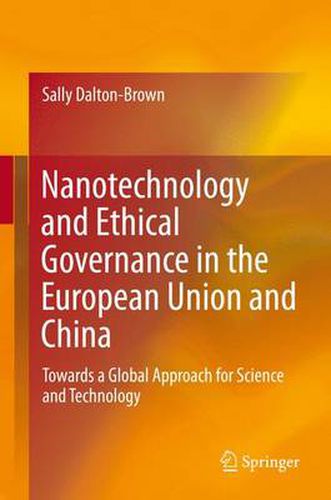Readings Newsletter
Become a Readings Member to make your shopping experience even easier.
Sign in or sign up for free!
You’re not far away from qualifying for FREE standard shipping within Australia
You’ve qualified for FREE standard shipping within Australia
The cart is loading…






This title is printed to order. This book may have been self-published. If so, we cannot guarantee the quality of the content. In the main most books will have gone through the editing process however some may not. We therefore suggest that you be aware of this before ordering this book. If in doubt check either the author or publisher’s details as we are unable to accept any returns unless they are faulty. Please contact us if you have any questions.
This book addresses questions surrounding the feasibility of a global approach to ethical governance of science and technology. The emergence and rapid spread of nanotechnology offers a test case for how the world might act when confronted with a technology that could transform the global economy and provide solutions to issues such as pollution, while potentially creating new environmental and health risks. The author compares ethical issues identified by stakeholders in China and the EU about the rapid introduction of this potentially transformative technology - a fitting framework for an exploration of global agency.
The study explores the discourse ethics and participatory Technology Assessment (pTA) inspired by the work of Jurgen Habermas to argue that different views can be universally recognized and agreed upon, perhaps within an ideal global community of communication. The book offers a developed discourse model, utilizing virtue ethics as well as the work of Taylor, Beck, Korsgaard and others on identity formation, as a way forward in the context of global ethics. The author seeks to develop new vocabularies of comparison, to discover shared aspects of identity and to achieve, hopefully, an ‘intercultural personhood’ that may lead to a global ethics.
The book offers a useful guide for researchers on methods for advancing societal understanding of science and technology. The author addresses a broad audience, from philosophers, ethicists and scientists, to the interested general reader. For the layperson, one chapter surveys nanoissues as depicted in fiction and another offers a view of how an ordinary citizen can act as a global agent of change in ethics.
$9.00 standard shipping within Australia
FREE standard shipping within Australia for orders over $100.00
Express & International shipping calculated at checkout
This title is printed to order. This book may have been self-published. If so, we cannot guarantee the quality of the content. In the main most books will have gone through the editing process however some may not. We therefore suggest that you be aware of this before ordering this book. If in doubt check either the author or publisher’s details as we are unable to accept any returns unless they are faulty. Please contact us if you have any questions.
This book addresses questions surrounding the feasibility of a global approach to ethical governance of science and technology. The emergence and rapid spread of nanotechnology offers a test case for how the world might act when confronted with a technology that could transform the global economy and provide solutions to issues such as pollution, while potentially creating new environmental and health risks. The author compares ethical issues identified by stakeholders in China and the EU about the rapid introduction of this potentially transformative technology - a fitting framework for an exploration of global agency.
The study explores the discourse ethics and participatory Technology Assessment (pTA) inspired by the work of Jurgen Habermas to argue that different views can be universally recognized and agreed upon, perhaps within an ideal global community of communication. The book offers a developed discourse model, utilizing virtue ethics as well as the work of Taylor, Beck, Korsgaard and others on identity formation, as a way forward in the context of global ethics. The author seeks to develop new vocabularies of comparison, to discover shared aspects of identity and to achieve, hopefully, an ‘intercultural personhood’ that may lead to a global ethics.
The book offers a useful guide for researchers on methods for advancing societal understanding of science and technology. The author addresses a broad audience, from philosophers, ethicists and scientists, to the interested general reader. For the layperson, one chapter surveys nanoissues as depicted in fiction and another offers a view of how an ordinary citizen can act as a global agent of change in ethics.